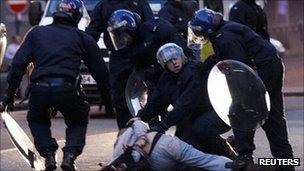England riots: Prison population rising by 100 a day
- Published

The Prison Governors Association has warned jails could run out of space
The prison population is rising by more than 100 people a day as courts deal with cases of rioting and looting, Ministry of Justice figures show.
Jail numbers in England and Wales have increased to a record high of 86,654, beating last week's total of 85,931.
The Prison Governors Association warned jails would run out of space if they continued to fill up at the current rate but there was no immediate crisis.
The Prison Service said it was developing contingency plans.
'Enough places'
A Prison Service spokesman said: "We are managing an unprecedented situation and all the staff involved should be commended for their dedication and hard work during this difficult time.
"We currently have enough prison places for those being remanded and sentenced to custody as a result of public disorder.
"We are developing contingencies to increase useable capacity should further pressure be placed on the prison estate."
The service said these contingencies included introducing new facilities early and reopening mothballed accommodation.
The Ministry of Justice (MoJ) figures, external are for the number of prisoners in jails, young offender institutions and immigration removal centres.
They do not include juveniles and children held in secure training centres and secure children's homes.
The increase means there has been a rise of 723 in the prison population in England and Wales over the past seven days.
The number of spare prison places is about 1,200 and there are also about 200 free spaces in immigration removal centres.
The MoJ said the "useable operational capacity" was 88,093. Two weeks ago the prison population in England and Wales was 85,523.
Prison Governors Association president Eoin McLennan-Murray said: "What is worrying is if the landscape of sentencing has changed.
"If the courts continue to be heavy-handed and use custody more readily than they have done previously then that would be problematic longer-term."
Howard League for Penal Reform campaigns director Andrew Neilson said the desire to send out a message was leading to "some very bad sentences which will be overturned on appeal".
A spokesman for the Law Society said justice should be administered promptly but also "effectively and fairly and with calm heads".
Shadow prisons minister Helen Goodman said: "I am becoming increasingly concerned about the level of capacity that we have remaining in the prison estate."
Cell demand
The prison population normally decreases or remains stable in August because there are fewer court sittings and offenders sent to jail.
But this year because of the disorder in London, Manchester, Birmingham and other English cities, numbers are rising sharply.
It means the number of spare places in the system is declining. Demand for cells is particularly high in London.
The Youth Justice Board said there was also "ample" spare capacity in secure children's homes and secure training centres which hold young offenders from the age of 10.
BBC home affairs correspondent Danny Shaw says ministers may come under pressure to keep open two prisons that were due to close next month - Brockhill in Worcestershire and Latchmere House in south-west London.
The Prison Service said there were currently no such plans nor were any places being used in cells at police stations under Operation Safeguard.
Meanwhile, the Metropolitan Police said it had arrested 1,802 people in connection with disturbances in London, and 1,032 of these had been charged.
'Aggravating features'
A judge has freed a woman in what is thought to be the first successful appeal against sentence in relation to the disturbances.
Mother-of-two Ursula Nevin, 24, was jailed for five months by a district judge after admitting to receiving a pair of shorts looted by someone else from a shop in Manchester city centre.
Judge Andrew Gilbart QC, at Manchester Crown Court, set aside the prison sentence because Nevin was at home at the time of the riots, and ordered her to do 75 hours' unpaid work in the community.
Prime Minister David Cameron has defended courts for handing out "tough" sentences for those involved in the riots.
The Guardian newspaper has published analysis of riot-related cases, external that suggests rioters are being given prison terms that are on average 25% longer than usual. It also says 56 of 80 offenders sentenced by magistrates - or 70% - have been jailed, compared with a rate of 2% normally.
Howard League for Penal Reform president, Liberal Democrat peer Lord Carlile, said some decisions were "questionable".
On Tuesday, two men were jailed for four years at Chester Crown Court for using Facebook to incite riots. Both are to appeal against the sentence.
Max Hill QC, vice-chairman of the Criminal Bar Association, said it was not the job of judges "to deliver a political message on behalf of the government" when passing sentence but part of their role was to identify "serious aggravating features that elevate the crime beyond the ordinary".
He added: "In the case of the two in Chester, it seems that is exactly what the judge has done."